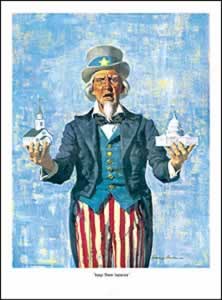July 20, 2010 | From
theTrumpet.com
By Robert Morley
Two years. That is how much time America has to fix its problems—or risk sudden collapse. This is the startling conclusion of Harvard historian Niall Ferguson. The world has seen what happens when investors lose faith in a country’s fiscal policy, he says. Just look at Greece.
Is it possible that the richest, most powerful country in the world could realistically be facing sudden collapse? After all, America isn’t Greece.
That is just the problem. America is not some small country that has overspent a few tens of billions of dollars. America is the world’s largest debtor, and it is addicted to debt. It is an empire now in evident decline—
like the Soviet Union in the late 1980s, or Rome just a few years before its fall—and it is borrowing trillions of dollars to maintain an unsustainable standard of living.
This year alone, according to the Congressional Budget Office, America will add $1.5 trillion more to its national debt. And under President Obama’s proposed spending plan, America will run trillion-dollar deficits until 2019.
Annual trillion-dollar deficits? And that is if everything goes according to plan: the wars in Iraq and Afghanistan neatly wrap up; there is no double-dip recession; employers start hiring again; the too-big-to-fail banks don’t need more money; and the Fed avoids accounting for government-owned Fannie Mae and Freddie Mac on its balance sheets.
What if things don’t go according to plan?
What if, asks Ferguson, the “Chimerica” relationship breaks down? China owns 10 percent of America’s public debt—that is a lot of leverage, and it is gaining more every day. What if, for political reasons, China stopped lending money to America, or worse, dumped American debt?
That is a question the experts either dismiss as unlikely or don’t like to think about. But even so, they generally agree that it could totally destroy the dollar. Yet, they claim it would never happen. China would be hurt just as bad because it would lose its biggest consumer market, they say.
Maybe that is true today, but what about tomorrow? China is the fastest growing major economy on Earth. In the years ahead, it is on track to overtake America. Its middle class is on the rise, and internal consumption is growing. One day China may not need indebted American consumers and a depreciating U.S. dollar. Then what?
U.S. battle carrier groups won’t be straying into the East or South China seas anymore. And who will protect little Taiwan, or the Philippines, or Australia for that matter?
Speaking at the Aspen Ideas Festival earlier this month, the British historian told business leaders and academics that America doesn’t have much time to reverse course. “I think this is a problem that is going to go live really soon,” he said. “In that sense, I mean within the next two years” (emphasis mine throughout).
“Fiscally and other ways,” America is “very near the edge of chaos,” he warned.
Ferguson said that historically, one indicator of looming collapse was when the cost of servicing a country’s debt became larger than the cost of its defense budget. This has never occurred in America before, he said. But it will be the case in the next five years.
Even if interest rates remain at historic lows, the interest payments alone will soon take up one in every five budget dollars, he noted.
If Ferguson is right, America had better hope that interest rates never—as in never ever again—shoot up to the double digits that America experienced in the 1970s. America would be bankrupted overnight. In other words, America had better keep its Chinese and Japanese lenders happy.
Debt can also lead to a sudden loss of military power and global respect, said the British scholar. History has many precedents. When the economy begins to crumble, military budgets often get slashed first.
America should not take consolation in the fact it has more aircraft carriers than the rest of the world combined: If this economic crisis continues, they are going to be mothballed.
Living in a world in which America is in decline will not be fun, he said. “[A] world in which the United Sates is no longer predominating is not likely to be a better world.”
However, Ferguson says, there is a way out for America. Here, after a brilliant analysis of America’s financial situation, he falls down flat.
To avoid collapse, he says, America needs to re-energize the two things that made America great: technological innovation and entrepreneurship.
Innovation and entrepreneurship?
Sure: Innovation and entrepreneurship played a role, even an important role, in making America. But they are certainly not the primary drivers of American greatness.
In his Thanksgiving Proclamation, Abraham Lincoln said: “The year that is drawing towards its close has been filled with the blessings of fruitful fields and healthful skies. To these bounties, which are so constantly enjoyed that we are prone to forget the source from which they come, others have been added, which are of so extraordinary a nature that they cannot fail to penetrate and soften even the heart which is habitually insensible to the ever watchful providence of Almighty God.”
Abraham Lincoln knew the source from which America’s greatness came. During an address on March 30, 1863, during which he declared a day of prayer and fasting, he stated:
[I]t is the duty of nations, as well as of men, to own their dependence upon the overruling power of God … and to recognize the sublime truth, announced in the Holy Scriptures and proven by all history, that those nations only are blessed whose God is the Lord …. We have been the recipients of the choicest blessings of heaven. We have been preserved, these many years, in peace and prosperity. We have grown in number, wealth and power as no other nation ever has grown: But we have forgotten God! We have forgotten the gracious Hand which preserved us in peace, and multiplied and enriched and strengthened us; and we have vainly imagined, in the deceitfulness of our hearts, that these blessings were produced by some superior wisdom and virtue of our own.
Many Americans used to believe as Lincoln did. Many Americans probably even took Lincoln’s admonition to heart.
But today, how many people truly believe that it is God who makes nations great?
The Bible is clear that God makes and breaks nations. He allows kings to rule and puts people on thrones. He blesses and He curses. It was blessings from God that were the most important factor making America great.
Yet now it is evident that those blessings are being taken away. The signs are everywhere. All over the country, paved roads are being ground up and turned into gravel. Some counties are simply letting the roads erode to gravel. Cities and counties can no longer afford the upkeep. Over 1 million homes will be foreclosed upon this year, if trends continue. In Kansas City, 29 of 61 schools will be closed to stave off bankruptcy. Many cities across America are changing ordinances to allow people to raise chickens for food. Other cities are refusing to enforce bylaws. In Michigan, people are resorting to barter and competing currencies are popping up. One chiropractor in that state says he accepts any form of silver, gold, chicken, and apple pie. In a state with so many unemployed people, you have to be creative to stay in business. He is open to all kinds of trades.
America today is radically different from the nation it was just two years ago. And incredibly, if Ferguson is right, it might not be recognizable in another two.
The Bible talks about a time when America, because of its problems, would face sudden destruction. Isaiah 30:13 describes America as a swelling wall that is breached, then suddenly breaks apart and comes collapsing down in an instant. Just like a levee breaking from a flooding river. The danger keeps building and building—until finally the levee bursts and falls in seconds!
And in the aftermath, not much is recognizable. Think New Orleans on a national level.
Admittedly, it is not a pretty picture—and if Ferguson is correct, there is not much time left to prepare. Source










































